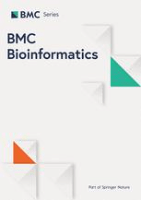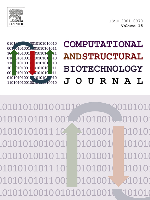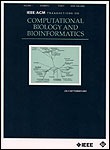
Quantitative Biology
Scope & Guideline
Exploring the Intersection of Numbers and Nature
Introduction
Aims and Scopes
- Mathematical Modeling and Simulation:
The journal emphasizes the development and application of mathematical models to simulate biological processes, including disease progression, genetic interactions, and cellular behaviors. - Bioinformatics and Computational Biology:
Research focusing on the use of computational tools and bioinformatics methods to analyze biological data, including genomic, proteomic, and metabolomic datasets. - Machine Learning and Artificial Intelligence in Biology:
The journal explores the application of machine learning algorithms in biological contexts, such as drug discovery, genomics, and predictive modeling of biological outcomes. - Systems Biology:
An integrative approach to understanding complex interactions within biological systems, including the modeling of cellular networks and organismal functions. - Synthetic Biology:
Research on the design and construction of new biological parts, devices, and systems, emphasizing quantitative approaches to understand and manipulate biological functions. - Clinical Applications and Translational Research:
The journal highlights studies that translate quantitative biological research into clinical applications, focusing on diagnostics, treatment strategies, and personalized medicine.
Trending and Emerging
- Integration of AI and Machine Learning:
There is a significant increase in research applying artificial intelligence and machine learning techniques to various biological problems, from drug discovery to genetic analysis. - Omics Data Integration:
Emerging studies focus on integrating multi-omics data (genomics, transcriptomics, proteomics) to provide a comprehensive view of biological systems and disease mechanisms. - Network Biology and Systems Analysis:
Research is increasingly centered around understanding biological networks, including gene regulatory networks and protein-protein interaction networks, using quantitative methods. - Personalized Medicine and Predictive Modeling:
The trend towards personalized medicine is reflected in studies that utilize predictive modeling to tailor treatments based on individual genetic profiles and clinical data. - Synthetic Biology Innovations:
There is a growing interest in innovative applications of synthetic biology, particularly in designing genetic circuits and metabolic pathways for therapeutic and industrial purposes.
Declining or Waning
- Traditional Statistical Methods:
There has been a decline in the use of conventional statistical approaches in favor of more advanced machine learning techniques and computational models. - Basic Life Sciences Research:
Research that primarily focuses on fundamental biological principles without quantitative analysis is becoming less prominent, as the journal leans more towards quantitative and computational studies. - Single-Cell Analysis Techniques:
Although still relevant, the frequency of publications specifically addressing single-cell analysis methodologies without a quantitative or computational focus has decreased. - Epidemiological Studies without Quantitative Models:
Studies examining public health issues and disease spread without employing quantitative modeling approaches are being published less frequently. - Genetic Studies with Limited Computational Analysis:
While genetic research remains a core area, there is a noticeable decline in studies that do not integrate computational techniques for data analysis.
Similar Journals

BIOSYSTEMS
Advancing interdisciplinary insights in biological systems.BIOSYSTEMS is a prestigious academic journal published by Elsevier Science Ltd, dedicated to the interdisciplinary fields of applied mathematics, biochemistry, genetics, molecular biology, medicine, modeling and simulation, and statistics and probability. Established in 1967, this journal has carved a niche in presenting innovative research that bridges theoretical and practical aspects of biological systems, making it essential reading for researchers, professionals, and students alike. With a robust impact factor and a Q3 category ranking across various fields, BIOSYSTEMS is recognized for its contributions to advancing scientific knowledge and fostering collaborations among disciplines. The journal's rigorous peer-review process ensures high-quality and impactful articles that address complex biological challenges through quantitative and qualitative methods. As a vital resource for the academic community, BIOSYSTEMS invites submissions that enhance understanding of biosystem processes, enabling readers to stay at the forefront of research trends and applications.

BMC BIOINFORMATICS
Pioneering Research at the Intersection of Biology and Computer Science.BMC Bioinformatics is a leading open-access journal published by BMC, dedicated to the rapidly evolving field of bioinformatics. With its inception in 2000, the journal has established itself as an essential resource for researchers, professionals, and students alike, disseminating high-quality research that bridges the gap between biology and computational science. BMC Bioinformatics holds a reputable Q1 ranking in Applied Mathematics and Computer Science Applications, and a Q2 ranking in both Biochemistry and Structural Biology, reflecting its significant impact in these interdisciplinary fields. The journal's broad scope encompasses innovative methodologies, tools, and applications that drive progress in biological research through computational approaches. With open access since its inception, the journal ensures unrestricted availability of cutting-edge research findings, promoting knowledge sharing and collaboration in the global scientific community. As it continues to publish advancements up to 2024, BMC Bioinformatics remains a cornerstone for those seeking to enhance their understanding of bioinformatics and its vital role in modern science.

ACTA BIOTHEORETICA
Connecting Agricultural Sciences, Mathematics, and PhilosophyACTA BIOTHEORETICA is a distinguished academic journal published by Springer, offering a vital platform for the dissemination of research within various interdisciplinary fields including Agricultural and Biological Sciences, Applied Mathematics, Biochemistry, Genetics and Molecular Biology, Environmental Science, and Philosophy. The journal, with its extensive history since its inception in 1935, holds a significant impact factor within its respective categories, ranking Q2 in Agricultural and Biological Sciences and Q1 in Philosophy as of 2023. Its archives, spanning from historical publications to contemporary studies, serve as a rich repository for scholars, professionals, and students dedicated to advancing knowledge in these areas. ACTA BIOTHEORETICA invites contributions that push the boundaries of theoretical exploration and practical application, with the aim of fostering an understanding that bridges science and philosophy. Although not open access, the journal maintains wide accessibility through its integrated digital platforms, enhancing the reach and impact of published work worldwide. Its central office located in Dordrecht, Netherlands further accentuates its international appeal and significance.

COMPTES RENDUS BIOLOGIES
Connecting Researchers to Groundbreaking DiscoveriesCOMPTES RENDUS BIOLOGIES, published by the esteemed Académie des Sciences, is a prominent journal based in France that contributes significantly to the fields of Agricultural and Biological Sciences, Biochemistry, Genetics and Molecular Biology, as well as Immunology and Microbiology. With a notable Q3 ranking in several categories as of 2023, this journal serves as an essential platform for disseminating groundbreaking research and advancements in these disciplines. Access is currently available under open access options, enhancing the reach and accessibility of its published findings. The journal has been in continuous publication since 1959, with a current focus extending to 2024, ensuring that it remains at the forefront of scientific communication. With its diverse scope and commitment to quality research, COMPTES RENDUS BIOLOGIES plays a crucial role in fostering dialogue and collaboration among researchers, professionals, and students who are dedicated to understanding and addressing complex biological questions.

Computational and Structural Biotechnology Journal
Empowering Researchers with High-Impact Computational SolutionsComputational and Structural Biotechnology Journal is a premier open-access journal published by Elsevier, focusing on the intersection of computer science and molecular biology. Since its inception in 2012, the journal has established itself as a leading platform for innovative research, featuring groundbreaking studies in biochemistry, biophysics, biotechnology, and genetics. With a remarkable Q1 ranking in multiple categories, including Biochemistry and Genetics, it stands out for its high impact, evidenced by its strong Scopus ranking percentile scores. As a vital resource for researchers, professionals, and students, the journal aims to foster the dissemination of essential findings that leverage computational techniques to explore complex biological systems. In a rapidly evolving scientific landscape, Computational and Structural Biotechnology Journal serves as an indispensable resource for those looking to contribute and stay abreast of major advancements in the field.

PLoS Computational Biology
Transforming Complex Data into Biological BreakthroughsPLoS Computational Biology is a premier open-access journal published by the Public Library of Science, committed to advancing the understanding of complex biological data through computational approaches. Since its inception in 2005, the journal has made significant strides in the fields of Cellular and Molecular Neuroscience, Computational Theory and Mathematics, Ecology, Genetics, and Molecular Biology, achieving a notable Q1 ranking in various categories as of 2023. With an exceptional impact factor and an esteemed ranking—such as Rank #23/176 in Computational Theory and Mathematics—PLoS Computational Biology provides a vital platform for researchers, professionals, and students to disseminate their cutting-edge findings and insights. The journal's open-access model ensures that high-quality research is freely accessible worldwide, fostering collaboration and innovation across disciplines. Located in San Francisco, CA, it serves as a hub for the global scientific community, making it an indispensable resource for anyone at the forefront of computational biology and its diverse applications.

COMPUTATIONAL BIOLOGY AND CHEMISTRY
Empowering Researchers to Navigate the Frontiers of Computational Biology and ChemistryCOMPUTATIONAL BIOLOGY AND CHEMISTRY is a distinguished academic journal published by Elsevier Science Ltd, focusing on the dynamic intersection of computational biology, biochemistry, and chemistry. With an ISSN of 1476-9271 and an E-ISSN of 1476-928X, this journal is committed to disseminating high-quality research that employs computational techniques to solve complex biological and chemical problems. As of 2023, the journal holds a substantial impact factor reflecting its significance and rigorous peer-review process, categorized in the Q2 quartile for both Computational Mathematics and Organic Chemistry, alongside Q3 classifications in Biochemistry and Structural Biology. With a continuous publication history spanning from 2003 to 2024, it serves as a critical resource for researchers, professionals, and students alike. The journal offers various open access options, ensuring that vital research findings are accessible to a global audience, further enhancing collaboration across disciplines. Engage with cutting-edge studies and contribute to the evolving landscape of computational methodologies in the life sciences through this esteemed publication.

Molecular Systems Biology
Integrating Quantitative Insights into Biological ComplexityMolecular Systems Biology, published by SpringerNature, is a premier open access journal that has been a cornerstone in advancing the fields of biological science since its inception in 2005. With its ISSN 1744-4292, this journal exemplifies high scholarly standards, boasting an impressive suite of impact factors, including Q1 rankings across various disciplines such as Agricultural and Biological Sciences, Biochemistry, Genetics and Molecular Biology, and more, highlighting its significant contribution to the scientific community. The journal offers robust access options to facilitate innovative research dissemination, reaching a global audience while maintaining a commitment to fostering collaboration and dialogue among researchers, professionals, and students. With a focus on integrating quantitative approaches to biological systems, Molecular Systems Biology plays a vital role in addressing complex biological questions, paving the way for groundbreaking discoveries and advancements in healthcare, environmental sustainability, and functional genomics.

BioData Mining
Connecting Researchers in the Evolving World of BioDataBioData Mining is a distinguished open access journal published by BMC, focusing on the dynamic intersection of bioinformatics, computational mathematics, and molecular biology. Since its inception in 2008, this journal has provided a critical platform for researchers and professionals to publish their findings, contributing significantly to the collective knowledge in fields such as biochemistry, computational theory, and genetics. With a robust impact factor and a commendable h-index, BioData Mining continues to be a vital resource for academic and industrial advancements, ranked in the top quartiles in various categories according to the 2023 metrics. The journal's commitment to open access ensures that cutting-edge research is readily available to the global scientific community, thereby enhancing visibility and fostering collaboration among scholars. Whether you are a researcher, student, or practitioner, engaging with BioData Mining will equip you with relevant insights and developments in the fast-evolving realm of bioinformatics.

IEEE-ACM Transactions on Computational Biology and Bioinformatics
Unlocking Complex Biological Systems Through InnovationIEEE-ACM Transactions on Computational Biology and Bioinformatics is a prestigious journal published by the IEEE Computer Society, focusing on the interdisciplinary field of computational biology and bioinformatics. Established in 2004, this journal has made significant strides in contributing to our understanding of complex biological systems through quantitative methods and computational techniques, and it spans a converged publication period through 2024. As a notable resource with an impact factor that positions it in the second quartile in the domains of Applied Mathematics, Biotechnology, and Genetics, it serves as an essential platform for researchers and professionals seeking to disseminate their findings to a global audience. The journal ranks impressively in Scopus, with Applied Mathematics holding a rank of #38 out of 635 (94th percentile) and Genetics at #86 out of 347 (75th percentile), highlighting its significant influence in the scientific community. While the journal is not open-access, it provides valuable insights and cutting-edge research that are crucial for advancing the fields of bioinformatics and computational biology, making it indispensable for students, researchers, and practitioners alike.